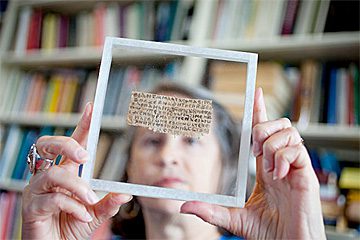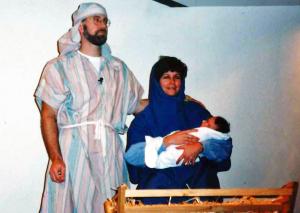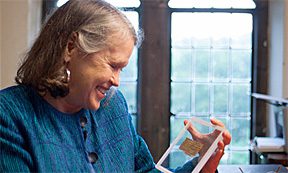Did Jesus have a wife, after all?
Major news outlets, such as the New York Times, are reporting on the discovery of a new document that refers to Jesus’ wife. More precisely, a small fragment from a previously unknown document contains a statement by a character named “Jesus” referring to “my wife.”
Does this give us new historical evidence for the literal marriage of Jesus of Nazareth to some woman, perhaps Mary Magdalene?

No, says Karen L. King, the scholar who recently revealed the existence of the manuscript fragment in which “Jesus” speaks of “my wife.” In an article to be published in the Harvard Theological Review, King writes:
This is the only extant ancient text which explicitly portrays Jesus as referring to a wife. It does not, however, provide evidence that the historical Jesus was married, given the late date of the fragment and the probable date of original composition only in the second half of the second century.
Near the end of her article, King, with contributions by AnneMarie Luijendijk, reiterates:
Does this fragment constitute evidence that Jesus was married? In our opinion, the late date of the Coptic papyrus (c. fourth century), and even of the possible date of composition in the second half of the second century, argues against its value as evidence for the life of the historical Jesus.
Of course, King’s measured judgment here will do little to stop the coming tidal wave of claims that we now have definitive evidence if not proof that Jesus was actually married. Dan Brown and his spokesman, Sir Leigh Teabing, appear to have been right all along! At least this is what we’ll hear in the days to come.
In fact, as Karen King rightly observes, the discovery and publication of the fragment known as the Gospel of Jesus’s Wife in fact tells us nothing about the first-century man we know as Jesus of Nazareth. If it is genuine, the fragment of the otherwise unknown document will tell us something about the beliefs of people who lived a century or two after Jesus, though what exactly we should conclude on the basis of this small piece of an ancient manuscript is yet to be determined.
Several years ago, I wrote an article called Was Jesus Married? A Careful Look at the Real Evidence. I wrote this in response to the fictional “scholarship” found in Dan Brown’s bestseller, The Da Vinci Code. In this article, I sifted through the historical evidence for and against the marriage of Jesus, focusing on the New Testament as well as writings from early Christianity. I showed that there was no evidence whatsoever in the ancient texts for the marriage of Jesus. Today, I need to qualify what I wrote in light of the new evidence from the Gospel of Jesus’s Wife. I would say something like this:
In light of the recent publication of a fragment from the so-called Gospel of Jesus’s Wife, it seems possible that in the fourth century A.D., somebody wrote or copied a document in the Coptic language in which a character named “Jesus” uses the phrase “my wife.” If we understand this language in a literal sense, which may or may not be the right interpretation, then this fragment provides evidence that somebody (or a group of people) in the second or third century believed that Jesus was actually married.
Of course, it could turn out that the fragment of the Gospel of Jesus’s Wife is a forgery (though given what Karen King has described, I am not expecting this outcome). It could also turn out that the use of “wife” in this document is best understood in a non-literal sense. Part of what makes this case so tricky is the fact that we have very little of the original document (if there was an original document). But, even if, in the end, scholarly consensus supports the genuineness of the fragment and the literal interpretation of “wife,” we would do well to remember Karen King’s conclusion that the fragment “does not . . . provide evidence that the historical Jesus was married.”
If you’re not familiar with Karen King, let me say that she is a serious and highly-accomplished scholar whose particular expertise includes early Christian history and the Coptic language. In other words, she is someone who deserves to be taken seriously in the matter of this manuscript fragment. (Note: I did not know King when I was at Harvard. She came six years after I finished my Ph.D. there.) King is not some huckster who is seeking to make a name for herself from some academically-suspect charade. Moreover, King has served us well by making available a pre-release of her official article (http://templatelab.com/King-JesusSaidToThem/) that will appear in the Harvard Theological Review (January 2013). Clearly, King is encouraging a serious, responsible debate about the fragment that was made available to her last December (2011). I must give her credit, however, for knowing how to stir up popular interest in this fragment by naming it the Gospel of Jesus’s Wife. (It appears that she named the fragment, though I’m not positive about this.)
Tomorrow, I’ll have more to say about the Gospel of Jesus’s Wife and its implications for our understanding of Jesus. In the meanwhile, if you are looking for serious discussion of this fragment, let me point you to King’s article and some basic information from the Harvard Divinity School website. Also, you may be interested in my online article, Was Jesus Married? A Careful Look at the Real Evidence. As I mentioned above, I will need to edit this a bit to reflect the new data from Karen King. But my basic conclusions about the marriage of Jesus (or lack thereof) remain intact.











